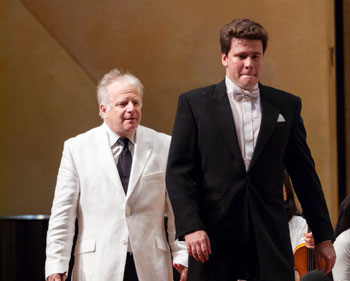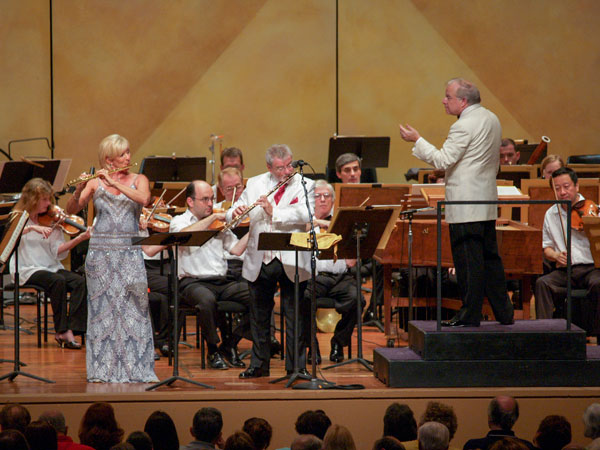By David Lewellen
After long, successful stints at the helms of three major orchestras, Leonard Slatkin, who celebrates his 75th birthday in less than a month, is enjoying the slower-paced life of a guest conductor.
Slatkin stepped down as music director of the Detroit Symphony Orchestra in 2018, marking the end of a 39-year run as a music director in the United States—first in Saint Louis, then the National Symphony in Washington, DC, then Detroit, which has named him its Music Director Laureate. (He has also been Conductor Laureate of the Saint Louis Symphony Orchestra since the 1996 conclusion of his tenure.) His calendar has far more open weeks now, but he will return to Ravinia to conduct the Chicago Symphony Orchestra in a program of Rachmaninoff and Rimsky-Korsakov on August 7.
“Once you’ve gone through the standard repertoire three times, that’s when people start to go, ‘Okay, it’s the same-old, same-old,” Slatkin says, reflecting on knowing when to look to new horizons. Beyond that, a directorship brings with it an expectation to boost the profile of the orchestra in the community and make an impact on arts education; “If you can’t do it in 10 years, you’re ineffective,” Slatkin observes, “and if you can, you have to decide if you can make it grow or step aside.” At the end of each of his tenures, “I thought I had accomplished all I could accomplish. It became about maintenance rather than growth.”
Nevertheless, he was able to make growth happen. Reviewing his accomplishments in Detroit, Free Press critic Mark Stryker wrote, “Under Slatkin’s watch, the DSO’s identity has morphed from an institution on life support into a financially stable, accessible, tech-savvy and artistically vital orchestra that’s deeply engaged with its community and back on the national radar as a feel-good comeback story.”
But leadership dynamics have changed since he became music director in Saint Louis in 1979, Slatkin says. At that time, typically the music director conducted more concerts and made more decisions. Now that administrators do more programming and take more artistic lead, he finds that “I’m old-school. I still like to be in charge of it all.”
During the Solti years, Slatkin was a regular guest conductor in Chicago, often leading three or four subscription weeks, usually with an emphasis on English or American music. “Maestro Solti was very kind,” he says, recalling the era when he, Solti, Erich Leinsdorf, and Claudio Abbado made up the CSO’s “gang of four.”
At 75, 40 years on from his first American music directorship, “I think now orchestras are getting more out of me,” says Leonard Slatkin.
But a summer concert, with one or two rehearsals, is a different environment. “Sometimes that creates an extraordinary performance, because of the edge-of-your-seat aspect,” Slatkin says. He and the orchestra both know Rimsky-Korsakov’s Scheherazade well—the CSO has played it both downtown and at Ravinia in recent years—so the first run-through will be to compare their ideas and “meet somewhere in the middle.”
Slatkin’s usual rehearsal procedure is to run a piece through once, making mental notes of problems or desired changes. On the second pass, he will try to conduct in a way that could fix the issue. If that doesn’t work, he’ll stop and make a comment, “and if I get a question or see a look, I’ll explain why. But it’s never appropriate to say, ‘Because I feel it this way.’ If you’re taking a ritard, maybe it’s to give the harmony some space, or to set up the next phrase. There always has to be a reason.”
He’s found that musicians generally prefer minimal discourse from a conductor during rehearsal, but when time allows, Slatkin will provide context for his take on a work. In the time-compressed rehearsals for Scheherazade, however, he will have to save his thoughts about the interest in “exotic” sounds from Asia that overtook many Western composers in the late 19th century, including Rimsky-Korsakov. If a musician raises an eyebrow, “I’ll say I’m doing it for a specific reason, and if you’re curious, ask me later.”
“A conductor’s job is mostly silent,” Slatkin continues. When he is teaching, a favorite exercise of his is to put on a video of a conductor and ask students to try to guess what the piece is. “With Bernstein, you would know within two bars what he was doing.”
Slatkin made his reputation, in part, as an advocate for American music, but the Russian repertoire that composes his Ravinia program on August 7 is also among his specialties. If someone wanted to find a link between the two traditions, he says, it could be that composers from the two nations “jumped around.” The Austro-German tradition that constitutes the center stream of the Western canon can be traced in a fairly straight line from Bach through the Second Viennese School, he notes. But that can’t be said of the Americans, with influences from all directions, or of the Russians, who “moved from the nationalism of Glinka to the symphonic era of Tchaikovsky, then into the exotic of Rimsky. Rachmaninoff took a page from the Romantics, avoiding sentiments of countries, both his own and the Eastern influences. So the early part of the 20th century saw a little of everything.”
In 1990, Slatkin conducted the American Soviet Youth Orchestra at Ravinia and a few other locations on tour as part of a multiyear effort between Oberlin College and the Moscow Conservatory to forge more literal links between the two traditions. Looking back on it now, “it was a very strange idea,” he says. Musicians from the two countries did not mix socially as much as the organizers had hoped, so “putting two cultures together didn’t produce much of an exchange of ideas.” But one piece on the program, Joseph Schwantner’s New Morning for the World, featured a narrator reciting speeches by Martin Luther King Jr., and Slatkin made sure to have a translator during rehearsals. “I tried not to make it political,” he says, “but there was a subtext.”
Whether the ideals succeed or not, conducting young people—and other educational efforts—has always been important to him. Whenever he’s engaged as a guest conductor, he tries to schedule a rehearsal, or even a performance, with the city’s youth orchestra, and he remains proud that he founded the Saint Louis Symphony Youth Orchestra in 1970—a group that now has 2,000 alumni, including six current members of the Saint Louis Symphony. “They did Scheherazade recently,” he beams, “which is not an easy piece, and I’m very proud of that.”
Slatkin makes a teaching visit to the Manhattan School of Music every year, and he frequently brings his experience to other conservatories as well. Beyond conducting, he tries to impart “the realities of the profession when you get out of school.” Students are taught plenty about Beethoven and Mahler, but much less about conducting a movie soundtrack or putting together a pops concert in one rehearsal, “and that’s what they’ll deal with if they get a job with an orchestra.”
Leonard Slatkin’s most recent appearance at Ravinia, in 2008, featured Denis Matsuev performing Rachmaninoff’s Third Piano Concerto in his Chicago Symphony Orchestra debut, a combination that will be reprised on August 7.
Not having commitments as a music director now means that he can spend more time advocating for arts education and thinking about what shape that might take. “My years in Washington taught me a lot,” Slatkin says. He is working on a book, talking to people in various fields about solutions in arts education, because “I’m tired of hearing about problems.”
Slatkin personally believes that music could be very effectively folded into history curricula; the example of Beethoven and Napoleon is only the most obvious. (Beethoven originally planned to dedicate his Third Symphony to Napoleon, then rescinded it after the French leader had himself made emperor.) “Any great work of art reflects society at the time,” Slatkin says. “Why not teach that?” Modern electronic resources, he pointed out, could easily integrate audio and video into their texts.
Slatkin also composes music, but “only when I want to”—in other words, he doesn’t accept commissions. But semi-retirement may allow more time for that too. His wife, Cindy McTee, is a noted composer—he led the Chicago premiere of her work Circuits at Ravinia with the CSO in 2003—“and I want to spend quality time with her, enjoying what we worked so hard for. I’ll know when it’s time to lay the stick down.”
A year removed from being the music director anywhere, “I never realized how stressful it was,” Slatkin says. Heart bypass surgery in the spring of 2018, shortly before his previously announced departure from the Detroit Symphony, was another reminder to take a look at the rest of his life. He and McTee recently moved to Saint Louis, where he has deep ties and can easily root for the Cardinals. With more time and attention to spare, “I think now orchestras are getting more out of me.” ▪
A great proponent of music education throughout his career, Slatkin first appeared at Ravinia in the early 1970s leading the CSO in children’s concerts. He then returned in 1990 with the American Soviet Youth Orchestra, and a 2005 concert saw Slatkin team up with fellow lifelong artist-educators Sir James and Lady Jeanne Galway.
David Lewellen is a Milwaukee-based journalist who writes regularly for the Chicago Symphony, Milwaukee Symphony, and other classical websites.




